- Home
- Alison McGhee
What I Leave Behind Page 3
What I Leave Behind Read online
Page 3
Carry on, my wayward son.
Next night after my shift, I’m walking in the direction of Playa’s house—because the gift giving starts tonight, right?—when the dog of insanity begins his insane barking. I’m still two blocks away, but wow. The block he lives on is loud to begin with, but still.
The dog of insanity lives on a big chain that runs from the orange tree in the backyard of his shitty house to the chain link fence in front.
Zip.
Back and forth, back and forth he races, the metal clip on his metal collar zipping along the chain.
Zip. Zip. Zip.
I’d be a man of insanity if I was chained up all day. How would I ever walk my way out of things? Answer: I wouldn’t.
You know what, dog-of-insanity owners? Fuck you.
You know what else? That dog needs a gift. Deserves a gift. All alone in the dark like that, zipping back and forth on the dirt track he’s worn into the yard. I decide to give him one of Playa’s. Why not, right? She’s got no idea.
Besides, Playa wouldn’t mind. Because she’s Playa.
Hence, this orange spiky rubber ball. This one’s for you, dog of insanity.
Back when I started walking, my mom didn’t mention it. I figured she was so distracted that she literally didn’t notice when I started disappearing for hours.
But now I think she knew. Because that’s when the notes started.
Love you, Willy.
Sleep tight, Willy.
Mama loves Will.
Et cetera.
It’s different, suicide. It’s a different kind of death. Most people, they’ll do anything to stay alive, right? Past the point where you’re looking at them and thinking, Wow. Your life must suck. Don’t you, like, want to die?
But most people don’t. They just want to keep on living.
Except not everyone.
My dad had a note in the back pocket of his pants. His khakis, which he never wore because, like, my dad? Khakis? No. But there you have it. There was a lot of that back then. Confusion. Weirdness. I guess there still is.
If you had known my dad, which obviously you didn’t, you would have laughed at the idea of him wearing khakis. Just not him.
But what was him? You know? Someone kills himself, someone who just seemed, I don’t know, happy?—you look back and you start to question things. Like old photos.
Like at my seventh birthday party, the party Playa’s dad was at too.
That one photo where my dad’s wearing the mullet wig and laughing. Really laughing. Like giantly laughing, and his hand’s on my shoulder.
Was he happy?
That’s the kind of thing that comes into your mind when someone kills himself. Like, was it all pretend? Or was he happy for real, and did something just change one day and boom, done.
The note said:
I’m so sorry. I’m so so so so sorry.
So it was a for-real suicide. That note proves it. Otherwise we wouldn’t know.
We would have wondered forever. Like did somebody jump him, some psychopath who decided to shove the guy in the dumb khakis up against the Fourth Street Bridge over the ditch known as the Los Angeles River and then heave him right over it?
At least I would’ve wondered.
Because without that note, I honestly don’t think I would’ve believed my dad killed himself. I would have thought there was some psychopath out there, walking around, remembering the day he killed my dad. So in a way I guess I’m glad he wrote the note.
In a way.
You know?
One block from here, past the dog of insanity’s house, past the park, past Playa’s, is where when I was thirteen I started walking.
Down our block, cross the street, down the next block and the next and the next I went, like I was going to the park like always, but then I just kept on going.
Every step at that point was new.
The whole world was new and where it was new began eight blocks from my house, because me and my dad had never walked there together.
I was on my own. Like it or not.
Walking, walking, and walking, me and my shorts and my flip-flops and the Bowie T-shirt, which I wore literally every day back then. I stole it out of my dad’s drawer after he died.
In the world beyond the one where my dad and I used to walk together, I didn’t have to think about how sad my mom was, didn’t have to think how my last word to him was Nah, and shit, that whole not-thinking thing? A huge relief.
Carry on, my wayward son.
Music is the refuge of the lonely.
You want some of my famous cornbread?
A whole bunch of little presents are coming for you, Playa. One per night. An anonymous friend hopes you like them.
Taco Loco. Estela’s Panaderia. Libros Schmibros. PAWN PAWN PAWN Bring Us Your Gold and Your Silver! McDonald’s.
Keep walking, feet. You know the way to Playa’s house. Well, here we are. Hello, front steps. Here’s a little white gift bag for Playa. Gift #1. Cookies. Cream-filled chocolate and vanilla, a sleeve of each wrapped up in cellophane with a picture of a smiling Asian baby girl. Yellow tissue paper.
And a note.
Don’t let the bastards get you down.
On the way home I backtrack past them all: McDonald’s now with Wi-Fi, PAWN PAWN PAWN, Libros Schmibros, Estela’s Panaderia, Taco Loco.
Past the sketchy hotel, past the other hotel, past the construction site. Then I decide to detour up the hill. It’s late, but screw it. Walk. Walk on. Walk tall.
Because little butterfly dude.
I miss him. You know?
Down the alley off State, even though no way would he be out at this time of night. Right up to his fence I go, though, and the security light clicks on and I look in, and . . . holy shit.
Damn. Little dude’s set himself up an altar.
The new red stepstool is set next to a baby agave that he must’ve just planted with the new blue shovel. Dirt still on it.
Can’t you see it, the little dude out there, digging away with his plastic shovel?
Stepstool. Shovel. Little dude probably thinks they dropped down from heaven. And then I see the butterfly binoculars, set in the middle of the stepstool. Ready for the visitation.
I stand so long the security light blinks off. There’s a faint light glowing upstairs in the little dude’s house. A night-light, maybe.
Then, holy shit, kid’s standing in the window, silhouetted against the light. He can’t see me, right? I stop myself from calling, “Little dude!”
It’s late. It’s dark. Kids need sleep.
It’s just when I’m mentally telling him to go back to bed that he waves. This little tiny wave, like Hey, mister. I know it’s you.
Sometimes do you wish there was like an early warning system? So when certain things are coming up, you’d know? And then you could close your eyes and keep them closed until you’re past the thing that’s going to claw at your heart?
Playa. The little dude. Might as well check on the dog of insanity as long as we’re on the topic. Right?
Oh my freaking God does he love that toy.
Zip.
That’s the dog of insanity racing along his chain to me at the back fence. That orange blur? The spiky ball clenched in his jaws.
Back and forth he goes. Sometimes he drops the ball, you can tell it’s deliberate, then pushes it with his paw. Like he’s trying to convince himself that it’s alive. Which must work, because then he dives on it again and off he goes.
Early warning system, please.
Because Major Tom and his motivational quotes, and the little dude and his altar to the butterfly gods, and my dad’s green plate, and the dog of insanity loving his toy so goddamn much, that kind of thing?
Gets in my brain and never goes away.
Ground control to Major Tom
Your circuit’s dead, there’s something wrong
Playa’s in my brain, and she will never go away either.
&
nbsp; This goes way back, to when we were little. And it has nothing to do with what happened at the party. This is before that. Second grade. Recess.
Most people can’t do the rings.
There’re a few exceptions. Like the little lightweight kids who grab the first ring, then propel themselves forward, one hand grabbing the next ring, then the next—swing—swing—swing—one ring after another until
Drop
—and they’re back in the sand looking around, like Did I just do that? And the answer is, Yes, you did. You just triumphed.
But like I said, most people can’t do the rings. Most people—adults and kids alike—you heave them up, and then they just . . . hang there.
Playa could do them, though. That girl? Badass.
She leaped right up—no help, no hesitation—and she clenched both hands around the first ring while she kicked her legs back and then
Ring
Ring
Ring
One after the other after the other, and she dropped down to the sand: Done. She brushed her hands off and then—I saw this because I was watching her from the top of the fort next to the rings—she clapped for herself. This tiny little clap, just the tips of her fingers clapping against each other. You could see her lips moving, whispering, Yay, Playa!
Early warning system, please. Please.
No one saw her do it. A Kick the Can game was taking up most of the playground, and there were just a few of us not playing. She probably thought she was alone.
Then boom, she looked up and she saw me watching her. I knew the exact look in her eyes: happiness to fear to suspicion to shutdown in half a second.
The kind of look where you have to do something instantly or you know she’s never going to look at you again, she’s going to avoid you forever. You know?
And so I did something instantly.
What I did was I nodded. I was up in the fort and I just looked her right in the eye, and I nodded. That’s all you need to do, I guess.
It’s simple.
But not. Because it sets something in motion and then it lasts forever. Like with me and Playa. That yellow dress on kindergarten Moving Up Day. The rings in second grade.
Like my dad’s green plate and those khakis and the risen-from-the-dead Jumble and that fucking cornbread that I can’t make for shit.
All of it. That stuff just burns and burns its way into you.
So ow confessed. Then ammy-oy. Then drick. Sentencing to come.
Playa’s back in school. Her friends walk her everywhere.
Bird-of-paradise notecards. Hairbands. Bendy straws. These are the things I leave for her. And the same note every night: Don’t let the bastards get you down.
Major Tom tilts his head out of his closet-slash-office.
“You okay, Dollar?”
He didn’t call me son. I’ll give him that.
“We good, Major Tom, we good.”
Confuse him with the we thing, shall we? Speak like Yoda in our heads, shall we? Put our hands together and bow in a namaste-like manner, shall we?
And what does Major Tom do?
Fist-bumps me. Big smile on his face. You can just tell how long he’s wanted to fist-bump someone. And now his chance has come.
Oh, Major Tom. You’re gonna kill me. Swear to God.
If he hadn’t done that—tried once again to be a cool, unlike-himself guy—I probably would’ve walked straight home after leaving Playa’s gift on the steps instead of where I do go, which is straight past Grand Central Market, Eggslut, and all the other food stalls and straight into Taco Loco, where I buy myself two tacos. Taco Tuesday.
And then I detour into the blessings store, which is what we called it when we were little and which is what I still call it. Old habits.
“Help you?”
That’s Dear Mrs. Lin. She doesn’t recognize me. How would she? It’s been a long time.
“Nah. Thank you.”
She nods and goes back to what she’s doing, which involves a pile of narrow red strips of paper and a gold stamper thing. Lots of red in Asian stores.
Is the hundred blessings case still in the way back? Maybe they got rid of it.
But no. It’s still here.
A couple of girls and their boyfriends are examining the hundred blessings, reading them aloud, studying the weird little bottles and candles.
I wait until they finish staring and pointing and laughing. Until the string of bells on the door jingles, which means they’ve left the store. Until there’s only the stamp stamp stamp of Dear Mrs. Lin’s gold stamper. She’s industrious as hell, Dear Mrs. Lin. Never stops working.
Now it’s my turn. Hello, blessings. And so we meet again.
To unbreak your broken heart.
To make a cloud of safety around you.
To light at night for peace.
“Help you?” Dear Mrs. Lin says again when I get to the counter, still not looking up from her red paper, her gold stamper.
“Yeah. These.”
She picks up each one, turns it around, examines it, rings each one up separately on the old cash register, even though all the blessings cost a dollar.
Ding.
Ding.
Ding.
She wraps each one up in white tissue paper and puts them in a plastic bag with the blessings store logo on it, which is the glowing-eyed face of some creepy-looking saint or angel or devil. Human, maybe? Sometimes you can’t really tell.
“You’re a good friend,” Dear Mrs. Lin says.
“Excuse me?”
She touches the bag with her finger that’s all gold from the stamp pad.
“These are for a friend, yes?”
“Maybe. Yeah.”
“See? I know.”
Then she looks up at me, and honest to God, she breaks into this huge grin. Like, I didn’t even know Dear Mrs. Lin knew how to smile. It’s like smiling’s a learned skill and she never mastered it. Like a checkbox on an elementary school report card that was always unchecked when it came to her.
But she’s looking right at me and smiling.
“You were little when I first see you. All this time you come in for blessings. So many years!”
She hands the bag to me.
“Good friend, good friend. I know.”
I’m almost out the door when she calls to me.
“Your father? Why I don’t see him anymore?”
She’s holding her gold-stained palm off the floor at the invisible line that’s me when I was a little kid. Because it was my dad I used to come here with.
I shrug. Shake my head. Hold the bag of blessings tight to my chest and out the door I go.
Back in second grade, it took Playa a second, maybe three, but then she smiled back at me. Her front teeth were missing—we all had a few teeth gone, it was the tooth fairy stage of life—and that smile was gigantic.
I could see why she didn’t smile much. Because when she did? It took over her whole face. Her whole body. She turned from a girl into a smile.
That was a long, long time ago. We were seven years old. But Playa, she knew right then, and she knew I knew, that I had her back.
Here’s what I think about sometimes: If I’d said Sure instead of Nah, would my dad still have jumped?
It’s an answerless question, like lots of questions. Why did he jump? Did he feel like no one had his back? Even though he had my mom and me and a thousand other friends—because my dad, he was one of those charming people who everyone loved—did he feel alone?
Did he feel like he was one thing on the outside and something else entirely different on the inside?
Does Major Tom feel that way?
Does Playa?
Do I?
Sometimes.
But what if it’s more than sometimes? Like what if you feel that way most of the time? Is that when you put on your khakis and put a note in your back pocket?
And then go floating off a concrete bridge and then off the planet?
I’ve been walking a long, long time. The butterflies must’ve come and gone in the little dude’s backyard.
The other day we got a shipment of butterfly nets. I opened them up and almost snatched one of them up and ran to the cash register to buy it, because butterfly net! Little dude!
But here’s the thing: the little dude isn’t a hunter of butterflies. He’s an admirer of butterflies. So I fill a big basket with the nets and then I make a sign.
INVISIBLE GHOST CATCHERS! TO BE USED ONLY FOR CATCHING INVISIBLE GHOSTS!
Because imagine all the little kids out there with invisible ghosts waking them up at night, freaked out, and if they have an invisible ghost catcher, they’ll be ready.
I wasn’t ready for my dad to die. Who is, right? Who’s ready for a lot of the shit that goes down in a life?
No one, maybe.
It’s late. Late on a Tuesday night and there’s a bag of blessings in my hand and a bag of cornmeal under the Bowie T-shirt that I still can’t let go of.
And a note on the table: Free Willy! Love, Mom.
I draw a fang-face smiley under it. She likes them.
Whatever.
More salt this time, some dried chili peppers, a can of corn, drained. Whatever. Does the butter hiss? The butter hisses. But does it taste good?
Nope. Not even with a ton of butter. Whatever the secret recipe is, I don’t know it.
Whatever, whatever, whatever, whatever.
By the time I’m done with the latest cornbread failure and the hiding of failure evidence, it’s like three a.m. and all of L.A.’s asleep. Maybe.

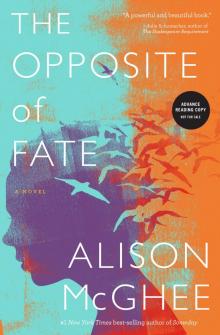 The Opposite of Fate (ARC)
The Opposite of Fate (ARC)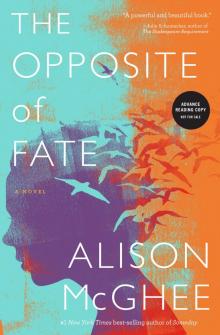 The Opposite of Fate
The Opposite of Fate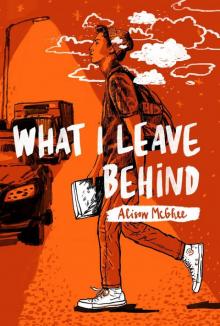 What I Leave Behind
What I Leave Behind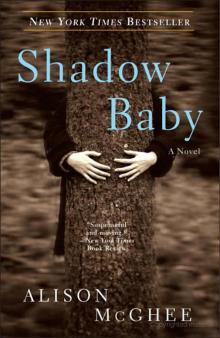 Shadow Baby
Shadow Baby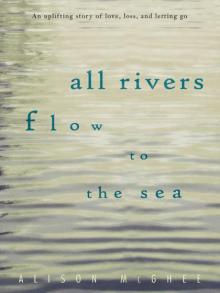 All Rivers Flow to the Sea
All Rivers Flow to the Sea Was It Beautiful?
Was It Beautiful?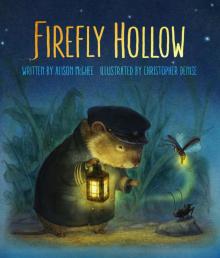 Firefly Hollow
Firefly Hollow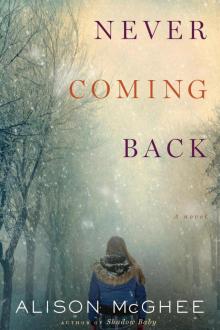 Never Coming Back
Never Coming Back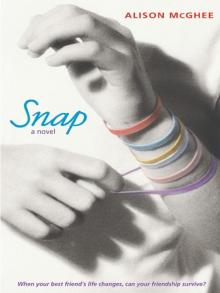 Snap
Snap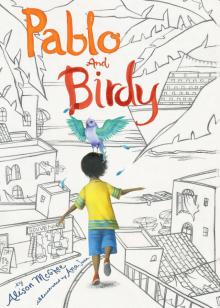 Pablo and Birdy
Pablo and Birdy